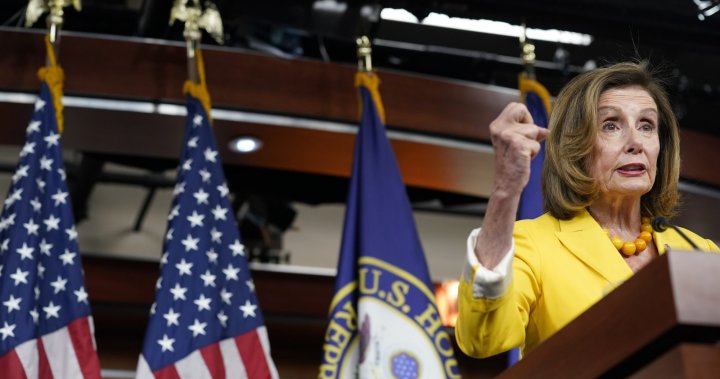
U.S. House passes massive climate and health bill in victory for Biden, Democrats
Global News
The Inflation Reduction Act includes about $375 billion over 10 years to encourage industry and consumers to shift from carbon-emitting to cleaner forms of energy.
A divided U.S. Congress gave final approval Friday to Democrats’ flagship climate and health care bill, handing President Joe Biden a back-from-the-dead triumph on coveted priorities that the party hopes will bolster their prospects for keeping their hold on Congress in November’s elections.
The House used a party-line 220-207 vote to pass the legislation, which is but a shadow of the larger, more ambitious plan to supercharge environment and social programs that Biden and his party envisioned early last year. Even so, Democrats happily declared victory on top-tier goals like providing Congress’ largest ever investment in curbing carbon emissions, reining in pharmaceutical costs and taxing large companies, a vote they believe will show they can wring accomplishments from a routinely gridlocked Washington that often disillusions voters.
“Today is a day of celebration, a day we take another giant step in our momentous agenda,” said House Speaker Nancy Pelosi, D-Calif. She said the measure “meets the moment, ensuring that our families thrive and that our planet survives.”
Republicans solidly opposed the legislation, calling it a cornucopia of wasteful liberal daydreams that would raise taxes and families’ living costs. They did the same Sunday but Senate Democrats banded together and used Vice President Kamala Harris’ tiebreaking vote to power the measure through that 50-50 chamber.
“Democrats, more than any other majority in history, are addicted to spending other people’s money, regardless of what we as a country can afford,” said House Minority Leader Kevin McCarthy, R-Calif. “I can almost see glee in their eyes.”
Biden’s initial 10-year, $3.5 trillion proposal also envisioned free prekindergarten, paid family and medical leave, expanded Medicare benefits and eased immigration restrictions. That crashed after centrist Sen. Joe Manchin, D-W.Va., said it was too costly, using the leverage every Democrat has in the evenly-divided Senate.
Still, the final legislation remained substantive. Its pillar is about $375 billion over 10 years to encourage industry and consumers to shift from carbon-emitting to cleaner forms of energy. That includes $4 billion to cope with the West’s catastrophic drought.
Spending, tax credits and loans would bolster technology like solar panels, consumer efforts to improve home energy efficiency, emission-reducing equipment for coal- and gas-powered power plants and air pollution controls for farms, ports and low-income communities.













